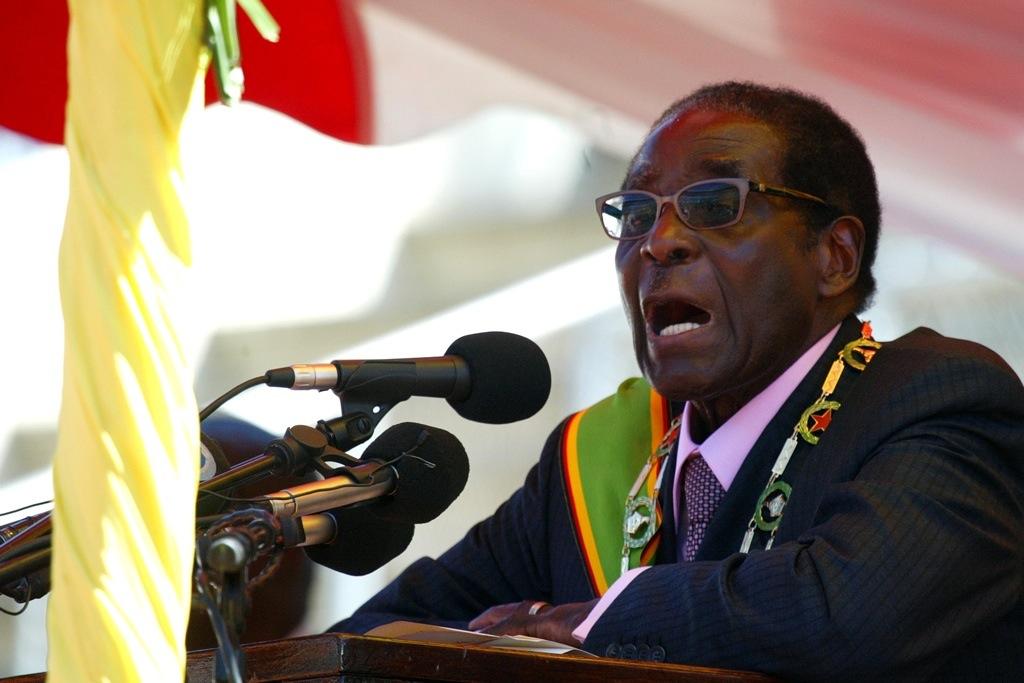South Africa ordered to investigate Zimbabwe torture
Zimbabwean President Robert Mugabe delivers a speech at a rally to mark the country’s 32nd independence anniversary on April 18, 2012 in Harare. Mugabe urged Zimbabweans to shun violence ahead of elections that he insists be held this year.
JOHANNESBURG, South Africa — A court order that South Africa must investigate charges of state torture in Zimbabwe could discourage new abuses by President Robert Mugabe’s regime, say activists.
Under the International Criminal Court’s Rome Statute, South Africa must probe alleged crimes against humanity during the bloody 2008 election campaign in neighboring Zimbabwe, South Africa’s courts ruled Tuesday.
“This judgment will send a shiver down the spines of Zimbabwean officials who believed that they would never be held to account for their crimes,” said Nicole Fritz, executive director of the Southern African Litigation Center.
The ruling means prosecutors must scrutinize Zimbabwean officials who regularly travel to South Africa on official and private business. This would ratchet up diplomatic tensions between the neighboring countries, and further complicate South African President Jacob Zuma’s role as mediator in talks on Zimbabwe’s political crisis.
More from GlobalPost: South Africa: Gold miners sue over lung disease
The case centers on a March 2007 incident in which police raided the headquarters of the then-opposition Movement for Democratic Change. Scores of MDC supporters were tortured, by being subjected to mock executions, waterboarding and electric shocks, according to detailed allegations compiled by the litigation center and the Zimbabwe Exiles Forum.
But South African prosecutors refused to investigate the Zimbabweans, citing "political considerations.”
The new ruling, the first on South Africa’s commitments under the ICC, found that the police and national prosecuting authority acted unconstitutionally and unlawfully in refusing to pursue the charges.
South African authorities should investigate the charges in the interests of Zimbabwean "victims of the torture who had been denied the opportunity to see justice done, and the general South African public who deserve to be served by a public administration that abides by its national and international obligations," stated the judge.
The ruling advances the reach of the International Criminal Court among countries that are signatories, according to legal experts. A Kenyan court ruled in November 2011 that Sudan leader Omar al-Bashir should be arrested if he comes to Kenya because he had been indicted by the ICC. The new South African ruling goes further to say that ICC signatories are obliged to investigate and arrest foreigners accused of torture and other atrocities.
More from GlobalPost: Zimbabwe poisoned by 'toxic' economic policies: Tsvangirai
The allegations made in court named 17 Zimbabwean officials alleged to have tortured, though their names have not been made public.
The strength of the evidence of state violence in Zimbabwe succeeded in persuading the judge, said Gabriel Shumba, director of the Zimbabwe Exiles Forum, a support group based in South Africa.
“The perpetrators sometimes come to South Africa to do their shopping, to get medical treatment,” said Shumba, who added that they should instead be worried about arrest.
Mugabe’s government is responsible for “widespread and systematic abuses,” including the killing of up to 200 people and the beating and torture of more than 5,000, according to Human Rights Watch.
Mugabe’s security forces and his Zanu-PF party continue to beat, torture and kill political opponents, despite the creation of a power-sharing government in 2008 intended to end political bloodshed, said Human Rights Watch.
The court ruling could discourage those abuses before the elections expected later this year, said Dewa Mavhinga, acting director of the Crisis in Zimbabwe Coalition, a human rights group.
“Just next door, South Africa is prepared in terms of the law to act on [the torture],” Mavhinga said.
“The decision could not have come at a better time,” he added. “We are now witnessing a rise in violence because of the talk about an election.”
Shumba, a human rights lawyer, was himself a victim of torture following his 2003 arrest while representing the opposition MDC. He was tortured with electrodes placed on his tongue, feet and genitals, according to Amnesty International, and he has been in exile in South Africa ever since.
“That is what inspires me to fight for justice,” he said. “We are just disappointed that this took so long.”
More from GlobalPost: Economic growth pulls Rwandans from poverty
The article you just read is free because dedicated readers and listeners like you chose to support our nonprofit newsroom. Our team works tirelessly to ensure you hear the latest in international, human-centered reporting every weekday. But our work would not be possible without you. We need your help.
Make a gift today to help us reach our $25,000 goal and keep The World going strong. Every gift will get us one step closer.
